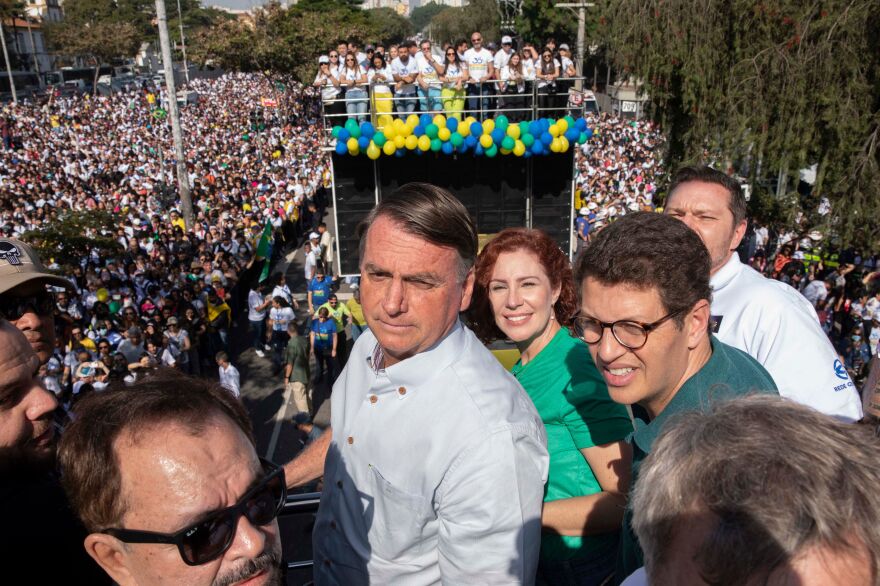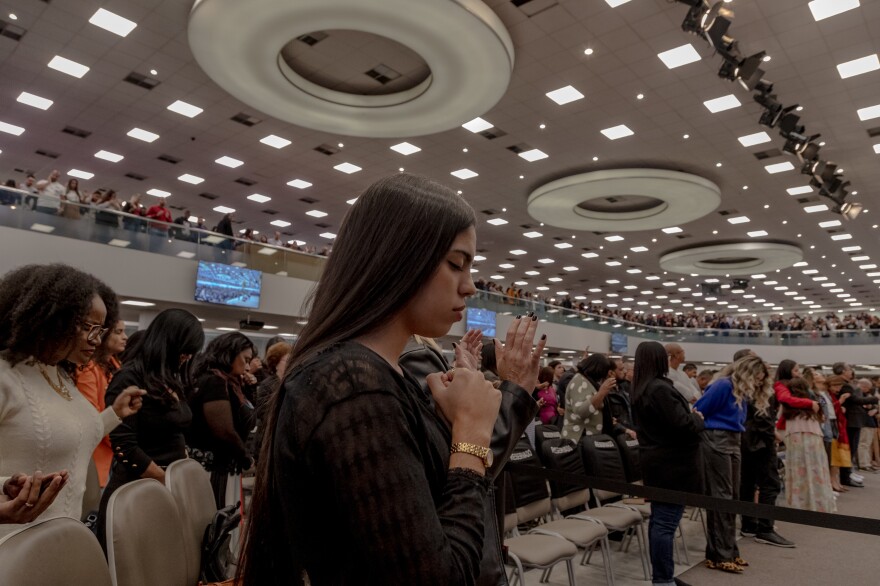Updated August 29, 2022 at 10:40 AM ET
RIO DE JANEIRO — Before about 500 worshippers at an evangelical Christian church in a working-class Rio neighborhood, Pastor Abner Ferreira works himself into a frenzy describing the power of God to save souls.
But he's just as fervent about politics.
During the nearly three-hour service, Ferreira praises Brazilian President Jair Bolsonaro and displays photos of himself alongside the right-wing leader on a giant screen displayed behind the altar.
Later, in an interview with NPR, he says evangelicals are drawn to Bolsonaro because he promotes conservative family values and opposes abortion and same-sex marriage.

With the president seeking another four-year term in the Oct. 2 election, Ferreira predicts: "I am sure that evangelicals will vote massively for Bolsonaro."
Bolsonaro is relying on their support to pull off an upset. He trails his main opponent in the race, former President Luiz Inácio Lula da Silva, in all of the polls, mainly due to Brazil's stagnant economy.

In the last election, evangelicals, who now make up nearly one-third of the Brazilian population, demonstrated their clout. Nearly 70% of them favored Bolsonaro ahead of the 2018 presidential election runoff, helping him score an easy victory, according to the Brazilian polling firm Datafolha.
Nearly one-fourth of Brazil's Congress is made up of evangelicals, while Bolsonaro has named them to his Cabinet. In December, he appointed the first-ever evangelical pastor, André Mendonça, to the Supreme Court. Upon the announcement, first lady Michelle Bolsonaro, a fervent evangelical, was ecstatic, jumping up and down shouting "Hallelujah!"
It's a huge change for Brazil, which has long been the world's largest Roman Catholic country. For a time in the 1800s, Catholicism was its official religion while other denominations were not allowed to open churches, says Juliano Spyer, a Brazilian anthropologist who studies the evangelical movement.
Evangelicals — conservative Protestants who, in general, believe the Bible is the ultimate moral authority and that lives must be transformed through a "born-again" experience — made up just a tiny fraction of the population.
But amid mass migration from the countryside to Brazilian cities that started in the 1950s, evangelical churches began sprouting up in poor urban neighborhoods.
"People were coming from all sorts of places. They were disconnected from their families. And the church became this substitution for a family," Spyer says.
He recalls doing field work in a poor settlement near the Atlantic coast city of Salvador. It had one Catholic church and 80 evangelical churches which, due to fewer internal regulations and bureaucracy, are easier to open. In impoverished areas ignored by the government, he says evangelicals have stepped in to provide everything from spiritual guidance to day care and after-school sports programs.

"If you lose your job, there is an infrastructure for you to receive help. If your kid is involved in drugs, you can find a lawyer. So it's a huge attraction to be part of that organization," he says.
Among the faith's best-known projects are drug-rehabilitation centers, like the Desafio Jovem Ebenézer facility about an hour west of Rio. There, 128 live-in patients receive religious instruction and classes in auto mechanics and other technical training as they recover from addictions to cocaine, heroin and alcohol.
One of the supervisors, Carlos Faria, is a former drug addict who was treated here. He was living in the streets of São Paulo when evangelical pastors invited him into a church. Soon afterward, he was admitted to the rehab center where, Faria says, through the help of God, he kicked his cocaine addiction.
"I was going through some very hard times," Faria says as he walks around the grounds of the treatment center. "But I found refuge in Jesus Christ."

Evangelicals now make up 31% of Brazil's population, according to a 2020 survey by Datafolha. They're still outnumbered by Catholics, who make up about 51%, according to the survey, but evangelicals are growing at a much faster clip.
Looking ahead, José Eustaquio Alves, a demographer formerly with the government's Institute of Geography and Statistics, told the Infobae news service that evangelicals would match the Catholic population by 2032.
"In 10 years, Brazil will cease to be a Catholic country," Fabio Zanini, a columnist for Folha de S.Paulo newspaper who covered the rise of Bolsonaro and the religious right, told NPR.
However, not all evangelicals are conservatives. Many are poor, single mothers, and of African descent, and have often voted for left-wing political candidates due to their economic proposals, says Anna Virginia Balloussier, a Brazilian journalist who is writing a book about the country's evangelical movement.
Lula, as the former leftist president is known, is Catholic but he is also trying to woo evangelical voters, who analysts say are often more politically active.

"The evangelical community is more engaged in everything they do. And so it's easier to mobilize people in evangelical churches right now," Balloussier told NPR.
Bolsonaro is working hard to prevent evangelicals from defecting to Lula. At a meeting with evangelical pastors last month, Bolsonaro declared that real Christians don't vote for left-wing candidates. At another encounter in May, he told pastors that God entrusted in him a hard mission — the mission of leading Brazil.
The pastors responded with a standing ovation for Bolsonaro — and then by praying for him.
Copyright 2022 NPR. To see more, visit https://www.npr.org.



